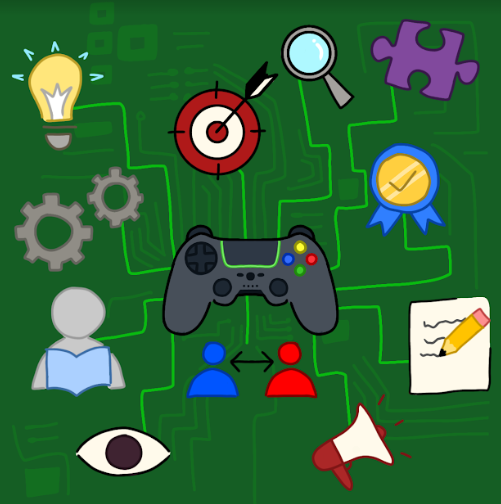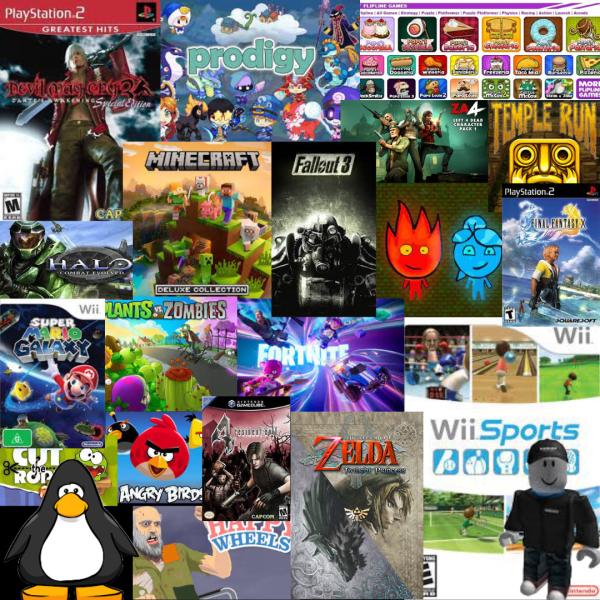The impact of video games inside and outside the virtual world: Elevating your social skillset

Paige Burgueno (created with ibisPaint X)
Gamers can benefit from playing different video game genres, and socializing is one important skill to have for many online multiplayer games; a player can improve their soft skills by interacting with others.
A large majority of people have played video games, even just once or twice. However, even casual games for an everyday gamer can become tedious, particularly after back-to-back losses and unfortunate luck. Casual or competitive, massively multiplayer online (MMO) or first-person shooter (FPS), sometimes there is no enjoyment in playing or even trash-talking other players. But other than just playing, one should also consider how they socialize, both inside and outside the virtual world. Call-outs, which are a form of communication in gaming to help provide crucial information (i.e. the status or location of an enemy) to help your team succeed, should not always be the only way to chat when playing with friends. An unhealthy amount of time playing video games can lead to dependency on talking virtually with online friends or within a gaming community. A player should redirect their real-life stat points elsewhere if they relate to any of the scenarios above.
For many people, video games have become a good method of socializing and bonding with friends in person or online. It can impact one’s abilities in an academic or communal setting. Depending on the genre and skill level, most virtual interactions in multiplayer co-op video games require socialization and collaboration to attain a more successful outcome. This can influence a variety of skills in different ways. People who game excessively are especially prone to its effects; one reason is because of the reward system. A battle pass, which is a tier system that rewards players with in-game cosmetics and items, is a prime example of how video game developers keep their players. Trophies, loot boxes, and/or in-game items are acquired by completing specific tasks in games. This allows players to level up and give a sense of accomplishment and progress.
It has been proven that video games can impact your performance and accuracy based on speed. An online article found that “different genres affect perception and strategy in very different ways.” Similarly to quality over quantity, a person performing tasks slower would have a higher chance of accuracy. This reflects on interactions; someone who has played a puzzle game would show more engagement than someone who has played an action game. They are quick at interacting, but less patient.
Senior Brianna Avila, president of the Gaming Club, explained that video games are a great way to bond with friends and find a common interest with other people.
“The more experience you have with different video game genres the more you can talk to people about them and the better you are at talking to people about certain subjects. Video games are still a great way to socialize with people if you want to make friends with people in the video game community. There’s people in all different skill levels [and is a] great escape from reality,” said Avila.
In addition to what Avila said, video games are a small break from a stressful day at work or school, plus it helps work on cognitive skills. However, it can become a problem when it becomes an addiction.
Although playing video games together can benefit a relationship, either with a friend or even a romantic partner, this can easily lead to an issue when too much time is spent on the game rather than communicating with each other. Most of the time, excessive gaming indicates other underlying problems such as anxiety or depression.
Anthony Mendoza, senior at NOVA Academy, explains the pros and cons of socializing on video games and the playstyles that come along with the different types of video games.
“Every genre you can have a lot of socializing. Video games have been a great stress reliever, especially when you play with friends, but it also brings excess stress sometimes,” said Mendoza.
Cognitive aggression, which is aggression that is intentional, is less likely to occur when playing with teammates. Games feel more fun when collaborating with a team, especially with friends. It brings in different ideas and perspectives, and sometimes help build upon leadership skills.
Jae Burgueno, junior at Saddleback, explains his thoughts on different players he has interacted with and how they affect his matches when playing.
“I hate throwers because they’re not trying. They don’t care and it affects everyone involved. When a team can for sure agree to collaborate, games go by quicker and smoother, but against each other, we end up losing. And it’s not just the fact that we lost, but also we could’ve easily won if just that one person helped out,” said Burgueno.
Throwers are people who purposely make mistakes and give away their or their team’s chance of winning. Being against each other, even in a team, can be the downside of the social aspect of video games; an argument can occur that can disrupt team communication, and miscommunication, or a lack of communication can lead to a faulty team.
Overall, video games can impact many aspects of a person. How someone socializes virtually through a video game can reflect on other tributes since conversing is a key component in multiplayer games and in real life.

My favorite song is Everlong by Foo Fighters, I like sans, and I can kind of play bass.











